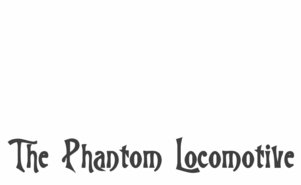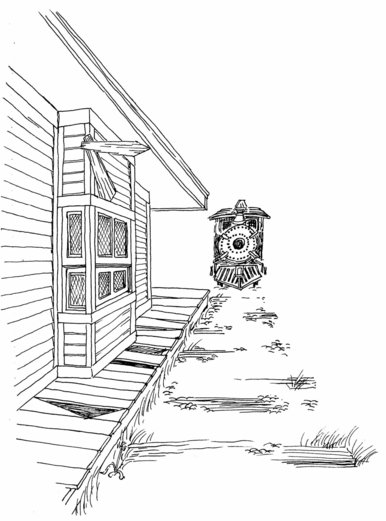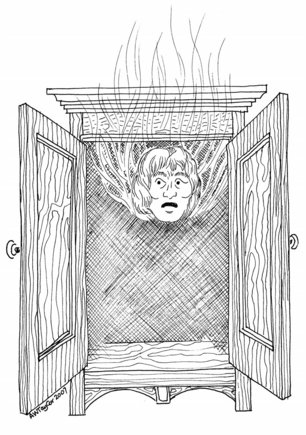The Golden Leg (2 page)
Authors: Dale Jarvis


O
n a rare fine evening in the second
week of the second month of the year 1907, the good Reverend Samuel Smith
decided to take a stroll. It was just before nightfall. The Reverend left his
neat wooden house, and with walking stick in hand, set out on his way. As he
walked along the path that stretched through the community, he ran over that
coming Sunday’s sermon in his mind, and tipped his hat to those neighbours he
passed. For that time of year, it was a most pleasant evening indeed.
Toward the centre of the community sat the railway station. As far as railway
stations go, it was a fairly modest affair, not nearly as impressive as some of
the other stations along the line, but more than adequate for the needs of the
locals. It was small, but well-maintained, and was painted a bright yellow, with
rich, dark green trim and the name of the town carefully painted in black
letters on a white signboard.
As he neared the station, Reverend Smith heard a familiar sound. He turned and
looked down the line. There in the distance was a steam locomotive, chugging
toward him.
“How curious,” thought the clergyman, checking his pocket
watch. “I did not think there was a train scheduled for this time of day.”
The train drew closer, and showed no sign of slowing down to stop at the
station. The Reverend watched as it moved closer, and felt the vibration of the
great engine shaking the earth as it roared past at a fairly good speed. From
where he stood, the clergyman could see several people on board, staring out
through the windows as they passed. He raised his walking stick in greeting, but
no one waved back, the passengers’ eyes fixed on something, somewhere off in the
distance.
The train kept moving, eventually passing over the trestle on the outskirts of
town, out of sight and eventually out of earshot as well.
The clergyman decided he would stop in at the railway station and ask about the
train that had just gone through. The station was empty except for the ticket
agent, and the clergyman addressed his questions to that man.
“No train has passed through here,” said the agent, looking at the Reverend
with a look of some puzzlement.
“But it did,” said the clergyman. “I saw it myself, felt the vibrations of the
engines, and saw several people on board.”
The agent was mystified, and stated again with great assuredness that no train
had passed. He checked the timetables, and found that a train had not been
scheduled, nor was one expected, but the clergyman persisted in saying he had
seen one.

News of the phantom train was telegraphed up along the line, but
no train arrived at the next stop.
Soon after, the story was made known in the community, and much to the
clergyman’s relief, others corroborated his
story. They too had
seen the strange train at the time mentioned by the clergyman. However, no
explanation was ever found. The railway hands who worked that section of the
line were somewhat spooked by the story, and from that point on were always
nervous about meeting the ghostly engine somewhere on the tracks.
Today that section of the line is silent. The tracks have been removed, and
only the small yellow and green station house remains. If you are very lucky,
however, on rare fine evenings in the second week of the second month of the
year, you may just hear the faint rumble of phantom wheels on the long abandoned
track, as that ghostly train continues its journey, conveying its mysterious
passengers to destinations from which no living traveller has ever
returned.

M
r. and Mrs. Murphy were on vacation,
and arrived in a city they had never visited before. Not knowing where to spend
the night, they consulted the local paper. From a long list of hotels, inns and
boarding houses, they chose one which they thought would best suit their
needs.
When they arrived, they were not disappointed. It was a charming old hotel with
a huge antique lantern hung over the entrance. The interior was just as
delightful, with walls, floors, and staircases all of oak.
The hotel was completely full, except for one room which Mr. Murphy quickly
booked. The room itself was at the end of a very long passage at the back of the
building. It was a surprisingly large room, with a gigantic four-poster bed
carved out of black wood, and a matching wardrobe set against one wall. Mrs.
Murphy unpacked their belongings while Mr. Murphy relaxed, nibbling on
gingerbread and reading the newspaper.
As the wife unpacked, her eyes were drawn for some reason to the old black
wardrobe. She opened it up, and found that it was dark, deep, and completely
empty. As she
looked into it, she felt a curious sensation which
was not entirely pleasant but which she could not exactly explain.
Putting the strange sensation out of her mind, she firmly closed the door to
the wardrobe and finished unpacking. The couple then both relaxed, and chatted
about their day. It was only when a clock from a nearby church boomed twelve
that the couple realized how late it had grown. They both got ready for bed,
slipped between the clean white linen sheets on the four-poster bed, and turned
out the lights.
Mr. Murphy quickly fell asleep and began to snore. Mrs. Murphy lay awake and
listened to her husband. Normally she found the sound of his snoring
troublesome. On this particular night, it was almost comforting, for a deathlike
hush seemed to hang over the house. The silence was broken by the odd creak and
footstep, the rustle of curtains, and distant sighs and whisperings. All of
these noises were, very possibly, the result of natural causes, but they played
upon Mrs. Murphy’s imagination.
As she listened, she became aware of a smell. At first it was just the faintest
whiff of something unpleasant. Gradually, it became a most offensive, pungent
odour, which seemed to creep up her nostrils. She did not know what could cause
such a distasteful smell, but it seemed to come from somewhere in the direction
of the black wardrobe.
Finally, she could stand it no more. She slipped out of the bed and crept
across the room. With every step she took, the stench increased. By the time she
reached the wardrobe, the stink was so strong that she was almost suffocated.
Mrs.
Murphy longed to be back in bed, but was unable to tear
herself away. She stretched out a trembling hand and swung open the door.
As the door yawned open, the hotel bedroom was filled with the faint,
phosphorescent glow of decay. The terrified woman saw, directly in front of her
own face, a human head floating in mid-air. She could only guess it was the head
of a man, from the matted crop of red hair that hung down over the forehead and
ears. The rest of the face was a loathsome, disgusting mass of decomposing
flesh, too foul and vile to even describe. Unable to move or speak, she stood
there, petrified.
With a start, the abnormal thing began to move forward. The strange spell that
had rooted Mrs. Murphy to one spot was broken. With a cry of horror, she fled
back to the bed and woke her husband.
His terror was even greater than hers; neither of them could speak. The head
veered around and started to move swiftly toward them. As it drew closer, its
awful stench caused the couple to retch and vomit. Mr. Murphy seized a lamp from
the bedside table and hurled it at the disembodied head. As they might have
expected, the lamp met no resistance. It passed right through the floating head,
and crashed against the wall behind.
The Murphys made a frantic attempt to find the door. With the head pursuing
them, they tripped over each other in their haste, and fell together in a
heap.
There was now no hope for the couple, as the stinking head had caught up with
them. It hovered directly above them
and descended lower, lower,
and lower. Finally, it passed right through them, through the floor, and
vanished out of sight.

It was a long while before either of the Murphys were sufficiently recovered to
rise from the floor. When they did, it was only to collapse exhausted onto their
bed. They pulled the covers up over their heads and there they hid, quivering
and quaking, till morning.
When the bright morning sun chased away their fears, they got up
and hurried downstairs and demanded to see the hotel manager. At first, the
manager tried to tell them it had all been a dream, but the Murphys were adamant
that they had both seen the floating head. They were about to leave when the
manager stopped them, and offered them another room for free if only they would
stay and keep the terrifying tale to themselves.
“I know what you say is true,” he confessed, and he explained to the couple
the origin of the head.
A hundred years earlier, a wandering peddler had been murdered in the building.
The unfortunate man’s body was walled up behind the oak panelling of the room,
and his head was hidden underneath the floor below the wardrobe. It was only
when the smell of the rotting head started to seep out into the room that the
murder was discovered.
The otherwise charming old hotel is still there, with the same huge antique
lantern hanging above the main entrance, though the haunted room is seldom used.
If, like the Murphys, you arrive there late at night, and the only room
available is one at the end of a very long passage, with a gigantic four-poster
bed and a matching black wardrobe, you may wish to find lodgings somewhere
else.

G
randfather King was a farmer. But back
in the 1930s, in the height of the Great Depression, things were not very good
for farmers. So, to help out his family and keep food on the table, Grandfather
King turned to a much more lucrative business. He started selling bootleg
rum.
No matter how bad times got, it seemed people always had money for a bottle of
rum. Perhaps it was because of the fact that times were so bad that people
always wanted it. So Grandfather King helped them out, and made a few pennies
doing so.
Now, it was hard to keep something like that perfectly quiet, and before too
long the police heard rumours of strange goings-on down at the King family farm.
Every so often they would stop by to visit Grandfather King, to see if they
could catch him in the act.
But Grandfather King was too smart for the police. He never kept his rum
anywhere they might find it. Instead, he carefully buried the bottles of rum up
in the back garden, in different places, under the cover of darkness. No matter
how hard they searched, the police could never find a
thing.
One night, when it was nice and dark, Grandfather King went up to the back
garden as usual to get a bottle of rum. He took his shovel, paced off the right
number of steps from the fence post, and started to dig. He had just reached the
first bottle of rum when he saw a very bright light coming toward him.
Grandfather King’s first thought was that the police had finally cottoned on to
his tricks. The light came closer, so bright that he could not look at it
directly. Grandfather King was not frightened, but he did not know what to do.
The light was so bright it almost blinded him.
As the light came closer to where Grandfather King was standing, it started to
dim. When it got dull enough that he could look at it, the man saw that it was
not the police with a lantern, but something much more unusual.
The light was coming from the very bright eyes of what could only be described
as a monster. In size it was taller than the tallest man, over nine feet in
height. It was jet-black and covered all over with hair an inch to an inch and
half long, and its eyes were like two big saucers. It had no clothing
whatsoever.
The Devil himself could not frighten Grandfather King, but Grandfather King had
never seen anything like the monster with the two glowing eyes. He started
digging again to see what would happen. The two great eyes grew brighter and
brighter, and the monster drew closer and closer.
Grandfather King stopped digging. The eyes grew dim once more
and the monster backed away, farther into the shadows. In haste, he started
shovelling dirt back into the hole, and as he filled in the hole the monster
disappeared.
Grandfather King took up his shovel, put it over his shoulder, and hurried
home. The next day he thought about what he was going to do. That precious rum
was still buried up in the back garden, but he was not about to go dig it up
during the day when people would be able to see. So he waited until nightfall.
When it was dark, he took his shovel and ventured up into the back garden once
more.
He found the fence post, measured off the right number of paces, and started to
dig. Just like the night before, as soon as he started to dig, the bright light
returned. As he dug, the hairy monster with the two great eyes drew closer and
closer. When he stopped digging, the eyes grew dim and the monster moved farther
away. He dug a bit more, and the eyes grew so bright he was almost blinded
again. Eventually, Grandfather King had to fill in the hole and go back to
bed.
Grandfather King became convinced that the monster was guarding something
buried in the back garden. He was certain the monster was afraid he was going to
find it, and this is why it appeared each night, warning him away.
Being a cautious man, Grandfather King decided to leave well enough alone. He
had no desire to enrage a monster nine feet high, covered with black fur, and
with eyes that shone like headlights. So from that point on he gave up the
bootleg rum business, and put his energies into more legal activities.
There are those who say the monster was guarding a great
treasure. The treasure had been hidden by pirates, and they had left the monster
behind to act as its protector until such a time that they could return. But the
pirates never came back.
It is said that the buccaneers’ treasure, along with a few bottles of well-aged
rum, still lie safely hidden, buried deep somewhere up in the back garden of
Grandfather King. If you don’t mind nine-foot monsters lurking in the darkness,
covered in fur, and with eyes as big as saucers, you are welcome to go and try
to find it for yourself.
